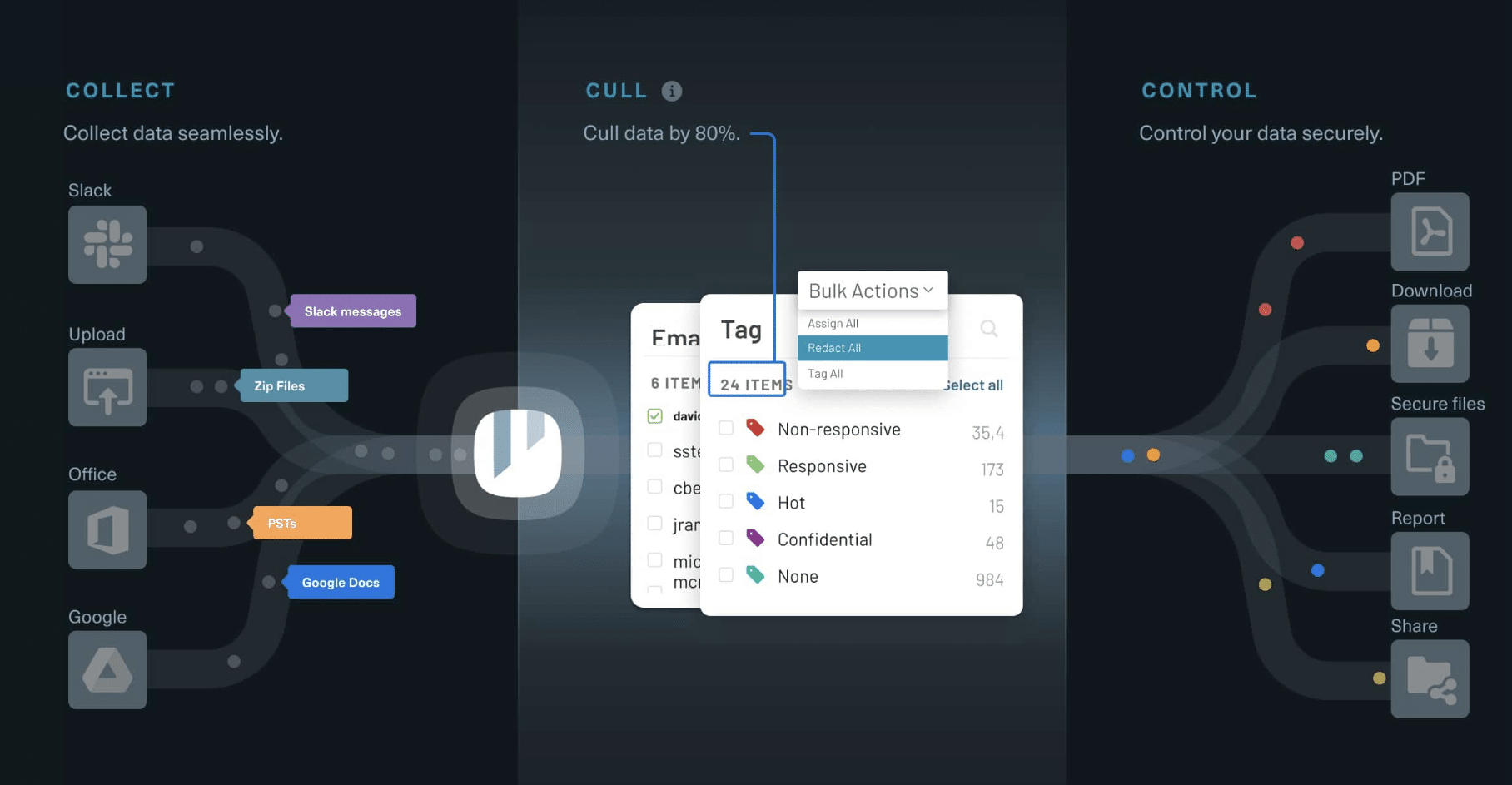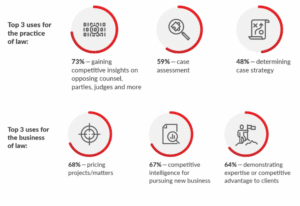The discovery stage of the legal process requires rifling through piles of files and documents to find relevant information to share with necessary parties. This process is tedious and prone to error if there are thousands of papers to look through. Many legal teams rely on eDiscovery platforms to perform document management and preparation. You can save extra time by working with a partner who prepares your documents in eDiscovery so your team can focus on the case while your support team handles the organization and redaction of crucial court documents.
Learn what eDiscovery is and how different factors impact the speed and cost of your eDiscovery service.
Key Takeaways:
- eDiscovery software automatically manages, tags, and redacts information on legal documents.
- Work with an eDiscovery partner to save you time and resources so you can access expert support throughout the legal process.
- The amount of redaction and actions necessary impact eDiscovery speed and cost.
What Is eDiscovery Software?
Electronic discovery (eDiscovery) software reviews electronic legal information and documents. Most eDiscovery platforms work alongside databases or file storage systems to allow for easy sharing between the platform and the legal team working on a case.
The eDiscovery market will reach 17.1 billion by 2027, making it a fast-growing solution for legal teams globally.
Ediscovery software for law firms saves legal professionals time by automatically performing steps that otherwise take hours. For example, the software seamlessly indexes files, scans for viruses, and prepares documents for review and redaction.

How the eDiscovery Process Works
There are four steps in the eDiscovery process:
Step 1: Upload Data
Many eDiscovery programs integrate with digital storage software like drives, Clouds, and file-sharing programs. This integration makes this step much simpler since teams can easily upload all relevant documents, emails, and communications.
The legal team manually uploads information if the software isn’t connecting to a file-sharing program.
Step 2: Review the Data
The legal team now begins reviewing all the documents and data. Some actions that the users can perform include creating searches, sorting files, and tagging files. These actions help legal teams organize documents and easily find relevant information for active cases.
For example, the eDiscovery user can sort information by creation date, document author, legal element, or subject tags to quickly pull up documents and information.
In addition to sorting information, the team can also manage the data to identify duplicate and irrelevant files so users can focus on the more important documents for the case.
Step 3: Create Actions
Now that the user organized the documents, the user can perform actions on records, like redactions or adding bates labels.
Step 4: Share Files
Easily and securely share documents through eDiscovery software to ensure all relevant parties have access to crucial case information.
Working with alternative legal service providers saves your team time and effort. Allow trained professionals familiar with the platform to import and organize legal data on eDiscovery so you can conveniently access information when needed. For example, our Exigent legal support team is ready to take care of the background document management through eDiscovery so you can focus on your case.
What Are the Common Features of eDiscovery Software?
What makes eDiscovery software different from other data management systems?
There are two key requirements for eDiscovery software:
- Manages data for legal teams working on court cases
- Manages legal documents, including pulling relevant information and sorting documents
In addition, eDiscovery software has added security and legal-specific features like redaction, allowing legal teams to remain compliant with the latest rules.
Examples of eDiscovery Software
Here are five of the top eDiscovery software companies on the market today that legal teams can use alongside a partner:
The benefit of Working with an eDiscovery Partner
While eDiscovery has many benefits and streamlines processes, it’s still time-consuming. Today, there are dozens of sources of information. People communicate over phones, computers, social media, collaboration platforms, and forums. Each new channel adds new data sources to track and manage court cases.
Legal teams already have plates stacked high with legal tasks related to the case. That’s why many legal teams prefer to work with partners rather than trying to add eDiscovery to their long to-do list. Partners can import data from all those sources and organize the data into easily accessed files with tags and redactions.
By working with a partner, legal teams have access to a talented team of trained professionals with expert knowledge of the system. As a result, the legal team doesn’t have to train on a new system and can focus on core tasks related to the case.
Partners became an extension of the in-house legal team, so the team still works together. However, now you have more support on your team who takes care of the data management side of the legal process.
Exigent is one of the leading eDiscovery partners with knowledge of dozens of eDiscovery platforms.
What Impacts the eDiscovery Process?
How many documents can legal teams process in a day, and how much does the eDiscovery process cost? Here are several factors that impact the cost and speed of the eDiscovery process:
The eDiscovery Purpose
Why are you using eDiscovery? If you need an initial review to look for relevant documents, the process will be much faster than the documents you want to code. However, the more tasks you need to perform through the program, the longer it will take, as your partner will need to spend more time on each document performing additional actions like adding tags.
Redaction Amount
Redactions are a necessary part of many document processes to ensure legal compliance. Your eDiscovery partner will keep all your documents adequately redacted for sharing and storage. However, redaction is more time-consuming than most other tasks since your partner wants to make sure they redact the correct information.
In most cases, a partner can process over 100 documents in an hour for simple processes. However, that number will go down to around 25 documents in an hour if your partner is carefully redacting information to remain legally compliant.

Format of Review Process
The more technology partners have to work with, the faster the process will go. For example, if you code all the documents and your partner can upload and review records using technology-assisted review, your costs and time will decrease. Meanwhile, the costs and time will increase if your partner needs to perform more manual tasks like encoding.
Type of eDiscovery Software
There isn’t just one eDiscovery software. Many partners work with dozens of different eDiscovery platforms. Each platform comes with a different speed and cost. For instance, a platform connected to a Cloud system for easy upload and sharing will be much faster and more convenient than one that requires more manual actions.
Find Your eDiscovery Partner
Exigent relieves your workload by handling the tedious tasks of organizing and tagging court documents so you can focus on legal proceedings and court cases. Our experts worked with dozens of leading eDiscovery platforms and can quickly and accurately prepare your documents for all legal occasions.
Schedule a consultation to learn more about our eDiscovery partner services.






